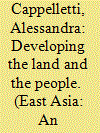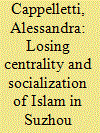| Srl | Item |
| 1 |
ID:
139540


|
|
|
|
|
| Summary/Abstract |
Social development in Xinjiang Uyghur Autonomous Region from 1999 to 2009 is the focus of this article. I will explore the current situation among Uyghurs and Hans living in Xinjiang in different social contexts and purviews, mainly assessing problems and open questions hindering a balanced and consensus-based social development in the area. The concept of “development” per se will be understood with a critical perspective. The fieldwork was conducted in 2011 and 2012 in Urumqi, Turpan, Kahsgar, Wujiaqu and Shihezi, and in eight rural villages—seven located in the Kashgar Prefecture and one in Kizilsu Kyrgyz Autonomous Prefecture. The opportunity to adopt an “insider perspective”, at the same time working with critical tools provided by the disciplines of sociology and anthropology, can be considered an important asset in the field of Xinjiang studies. My PhD research in China (2010–2013) and my work as consultant for KFW (2011–2012) have been of great help in adopting this approach. Interviews, participant observation and analysis of quantitative and qualitative data from different sources are the basis of the fieldwork results presented here. UNDP indicators and indexes are taken as reference in setting and organising data.
|
|
|
|
|
|
|
|
|
|
|
|
|
|
|
|
| 2 |
ID:
190086


|
|
|
|
|
| Summary/Abstract |
Cultural and political alterity in China is levelled by disrupting local communities and networks, both necessary to keep memories and sense of identity alive through sharing and socialising. By taking Suzhou’s mosques as focal lens, the author assesses an experiential void which is politically and socially created, and shows the consequences of rewriting history. The broken nexus between buildings, communities and memories impacts the historical centrality and socialization of Islam in Suzhou, where communities are dispersed and shared memories are lost. Mosques’ positionality in the urban fabric is assessed through interviews and interaction with local Muslims, and the identification of past surrounding communities and networks. The assessment of the heterotopic dimension and contested memories of Suzhou’s mosques in a contemporary context — performed by collecting historical, intellectual, topographical and architectural fragments — allows us to grasp the highly symbolic dimensions of a past diversity in identity spaces. The role of communities in relation with the city’s rich intellectual past — including its tradition of literati translating Islamic classics from Persian to Chinese — is understood as central, together with a spiritual geography made of connections and relations among places.
|
|
|
|
|
|
|
|
|
|
|
|
|
|
|
|